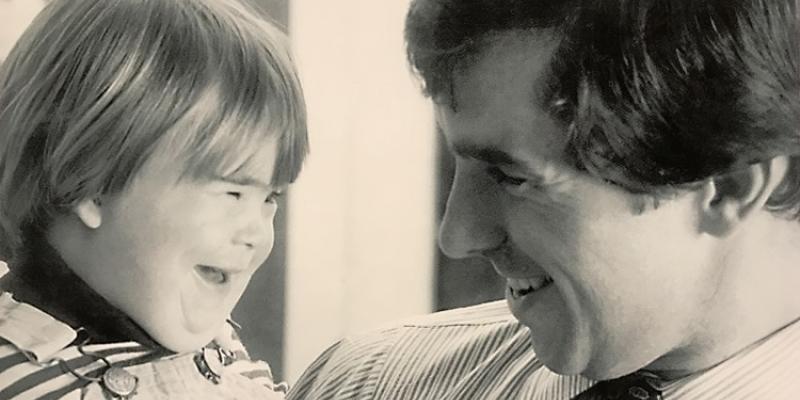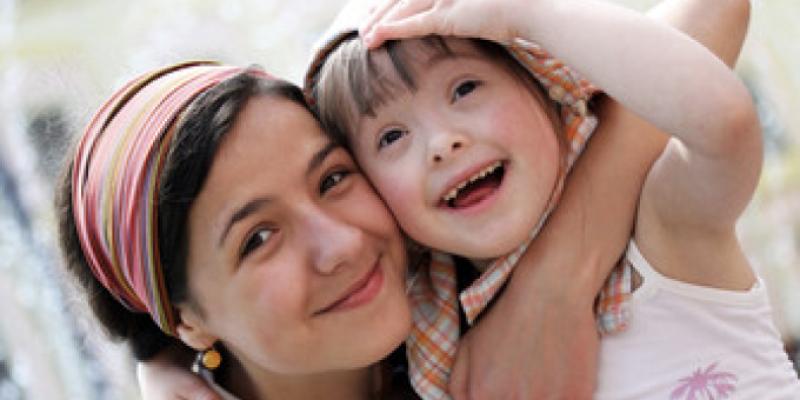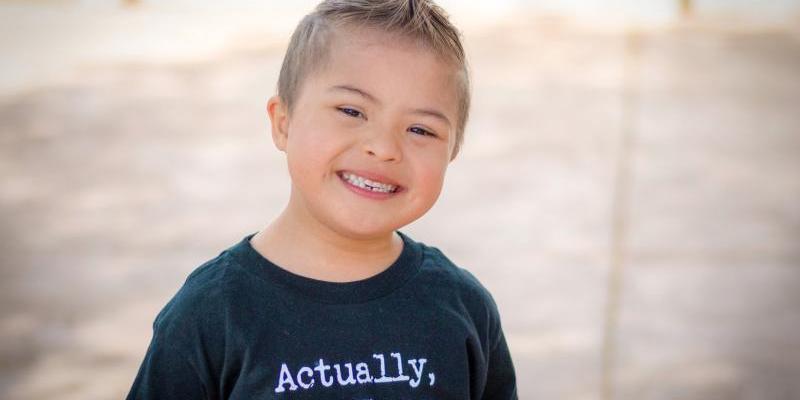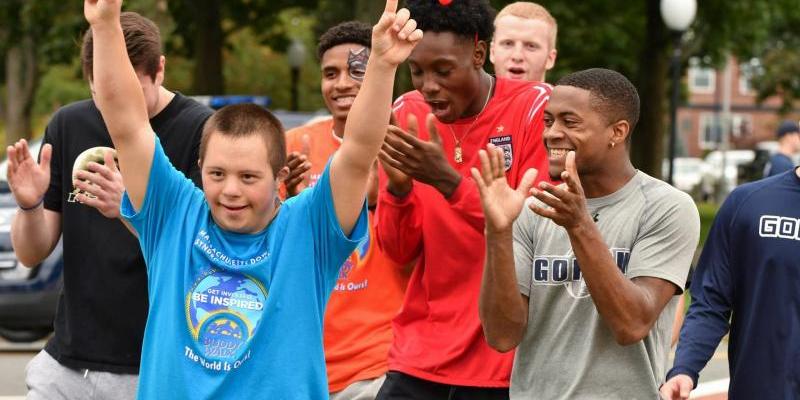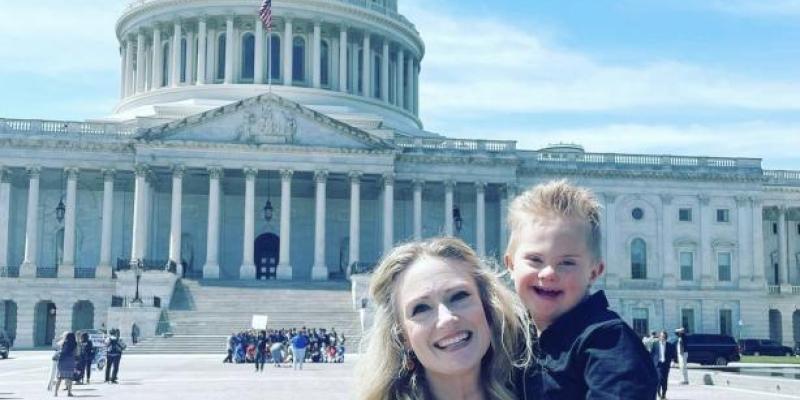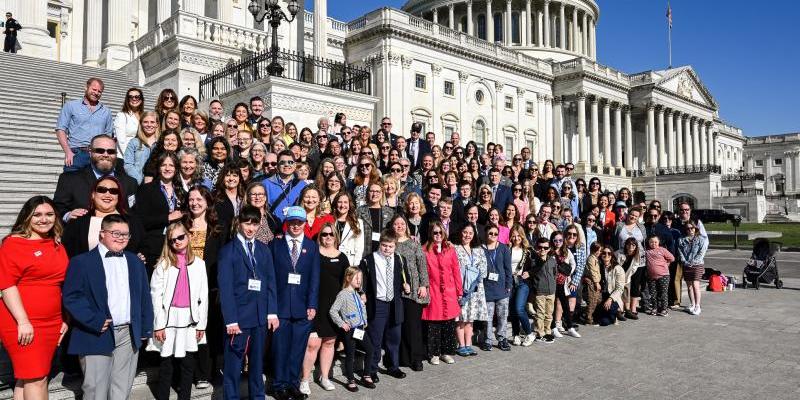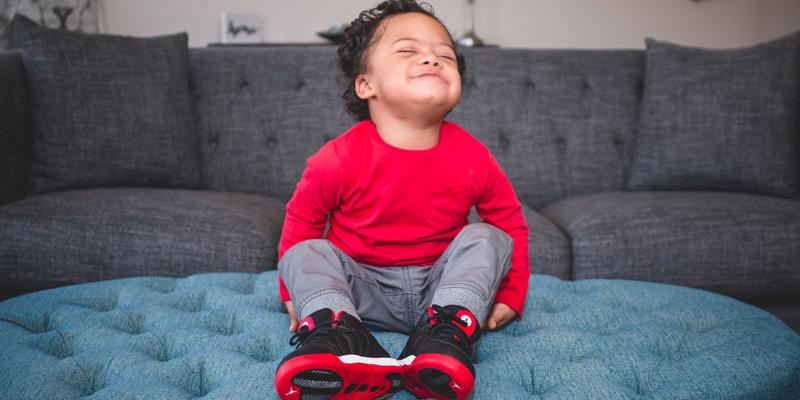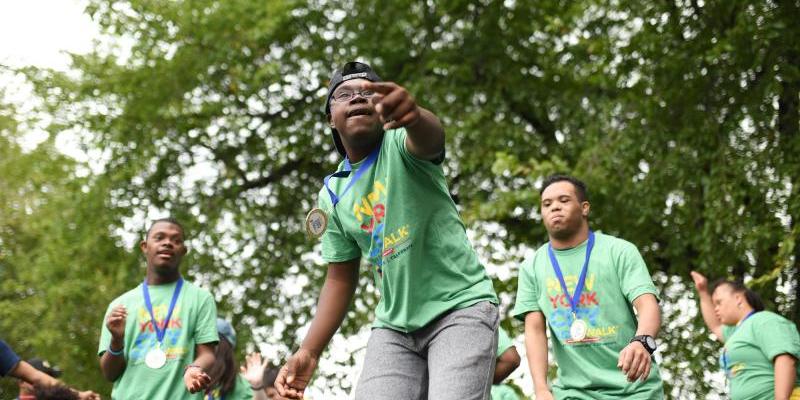National Down Syndrome Society Founded 1979
Carson Goodwin was born to Barton and Betsy Goodwin in 1978. Upon learning she had Down syndrome, the Goodwins dedicated themselves to gathering information and creating opportunities for Carson and other individuals with Down syndrome to grow and learn. Betsy collaborated with her close friend, Arden Moulton, and on June 20, 1979, the National Down Syndrome Society (NDSS) gained official nonprofit status.
Increasing Awareness & Acceptance
NDSS began its ongoing work to increase general public awareness and acceptance of people with Down syndrome. NDSS initiated its first awareness campaign with a baseball-themed public service advertisement titled “Give these kids a chance at bat,” which appeared in several magazines, including Time.
Science Scholar Award Program
NDSS awarded annual research grants, through its Science Scholar Award Program, to promising post-doctoral scientists who demonstrated extraordinary skill and achievement in seeking a better understanding of Down syndrome. This program became the Charles J. Epstein Down Syndrome Research Award. Studies funded through the award throughout the years investigated causes of Down syndrome, cognitive functioning, the connection between Down syndrome and Alzheimer’s disease, obesity, and leukemia.
First Scientific Symposium
NDSS hosted its first scientific symposium entitled, The Molecular Structure of the 21st Chromosome and Down Syndrome. This was the first of 14 scientific symposia hosted by NDSS.
Project Mainstream
NDSS launched Project Mainstream, which was funded by Honeywell, in which twelve kindergarten students with Down syndrome were selected from four school districts to spend part of each day in a typical classroom. Project Mainstream served as a model for parent support groups across the country to promote inclusion.
Project Child
NDSS and the Fresh Air Fund in New York City began Project Child. In this program, an inner city child with Down syndrome between the ages of six and 12 spent one weekend every six weeks with a host family outside New York City. Project Child was recognized by the White House with a Points of Light Award.
First Awareness Month
NDSS worked to have October officially proclaimed “Down Syndrome Awareness Month,” and this designation continues today.
Project Child Goes Nationwide
Action, a federal agency, awarded NDSS a grant to expand Project Child. By working with parent support groups in Florida, California, and New York, NDSS was able to successfully replicate and expand the program nationally. This collaboration was the start of partnerships that would become the NDSS Affiliate Network.
News & Views Magazine
NDSS launched News & Views, a magazine written for and by people with Down syndrome. Actor and Self-Advocate Chris Burke became the NDSS Goodwill Ambassador and served as editor of the magazine.
Educational Challenges Program
NDSS launched the Educational Challenges Program, which was the first national survey of inclusion for children with Down syndrome.
Groundbreaking Research
NDSS, the National Institute for Child Health & Human Development (NICHD), and National Institute for Neurological Disorders and Stroke (NINDS) launched a $3.9 million partnership to further Down syndrome research, particularly in the areas of cognition and behavior. At the time this represented the most funding ever earmarked for Down syndrome research. Six grants were awarded to fund research in these areas into development and related treatment for children and adults with Down syndrome.
Major Legislation Passed
The Ticket to Work and Work Incentives Improvement Act was passed, designed to help people who are receiving disability benefits from Social Security find good jobs, careers, and self-supporting futures. The Act was bolstered by intense lobbying by the NDSS policy team and a grassroots write-in campaign by NDSS Affiliates and members. This legislation helped to lay the foundation for competitive employment for people with disabilities.
The Buddy Walk
The Buddy Walk®, introduced in 1995, was a major breakthrough in promoting the acceptance and inclusion of all people with Down syndrome. There were 17 walks in 1995 and over 250 today.
Human Genome Project Contributions
Many NDSS researchers contributed to the map of chromosome 21, which was the first to be mapped as part of the Human Genome Project due to the relatively low number of genes on the chromosome.
Changing Lives Program
NDSS created Changing Lives: Down Syndrome and the Health Care Professional, which aimed to educate physicians, nurses, genetic counselors, and other health care professionals on the clinical and developmental needs of people with Down syndrome.
Everyone Counts
NDSS launched Everyone Counts: Teaching Acceptance and Inclusion, a curriculum for grades K-6 that encourages positive relationships between students with and without disabilities.
National Policy Center
NDSS established its National Policy Center in Washington, D.C. to work with members of Congress and federal agencies to develop and improve laws, regulations, and other policies; train and educate parents, self-advocates, and others to advocate on the local, state, and national levels; lead and participate in coalitions of national disability organization, and lead a comprehensive national advocacy program for Down syndrome.
Buddy Walk Goes Big
The Buddy Walk® was ranked in the top 30 fundraising events nationwide for money raised, revenue increase, and best series event.
Enrichment Fund
The O'Neill Tabani Enrichment Fund was established in 2005 to offer financial assistance to adults with Down syndrome who are enriching their lives by taking classes or enrolling in postsecondary education programs. More than $250,000 has been awarded to date.
My Great Story
NDSS unveiled its public awareness campaign, My Great Story, which honors and celebrates people with Down syndrome by showcasing stories written by and about them in a unique online storybook.
Prenatally and Postnatally Diagnosed Conditions Awareness Act
NDSS spearheaded the effort to help pass the Prenatally and Postnatally Diagnosed Conditions Awareness Act (Kennedy-Brownback legislation; Public Law 110-374). The law seeks to ensure that pregnant women receiving a positive prenatal test result and parents receiving a postnatal diagnosis will receive up-to-date, scientific information about life expectancy, clinical course, intellectual and functional development, and prenatal and postnatal treatment options. NDSS is carrying out the spirit and intent of this law by helping to facilitate the passage of Down syndrome information bills at the state level.
Congressional Down Syndrome Caucus
In May 2008, the Congressional Down Syndrome Caucus (CDSC) was formed under the leadership of Congresswoman Cathy McMorris Rodgers (R-WA). The purpose of the CDSC is to educate members of Congress and their staff about Down syndrome. NDSS works the CDSC to support legislative activities that would improve Down syndrome research, education, and treatment, and promote public policies that would enhance the quality of life for those with Down syndrome. In 2015, the CDSC expanded to a bipartisan, bicameral Congressional Task Force on Down Syndrome.
Buddy Walk on Washington
In 2010, NDSS held its first Buddy Walk® on Washington, at which hundreds of people gathered to advocate for annual legislative and policy priorities that span the life experience of individuals with Down syndrome from birth through adulthood and range in issues from healthcare to asset development. This event has evolved into the Down Syndrome Advocacy Conference and will take place annually. Learn more under our NDSS events!
NIH Down Syndrome Consortium
In September 2011, the National Institutes of Health (NIH) established an NIH Down Syndrome Consortium. The purpose of the Consortium is to foster the exchange of information on biomedical and biobehavioral research on Down syndrome being conducted by NIH institutes and centers working on Down syndrome-related topics and the national Down syndrome community. NDSS is represented on the Consortium.
DS-AMBASSADORS
In 2012, the NDSS DS-AMBASSADOR® program was created. DS-Ambassadors are volunteer advocates of all abilities committed to taking part in the democratic process and serving as liaisons between NDSS and their Congressional Delegations. The goal of the DS-Ambassador program is to build long-lasting relationships with US Congress people to continually raise awareness, educate, and advocate for public policy solutions that benefit the Down syndrome community at the federal level.
ABLE Act
In December 2014, NDSS’ number one legislative priority became the law of the land. The Achieving a Better Life Experience (ABLE) Act was passed in Congress and the President signed it into law on December 19, 2014. The ABLE Act will help people with Down syndrome live full, productive lives in their communities without losing benefits provided through private insurances, the Medicaid program, the supplemental security income program, the beneficiary’s employment, and other sources.
DS-Connect™: The Down Syndrome Registry
In 2014, NDSS became a part of DS-Connect™: The Down Syndrome Registry, the new Down syndrome registry hosted by the National Institutes of Health (NIH) and the Down Syndrome Consortium. The goals of DS-Connect are to gain a better understanding of Down syndrome, to learn more about the health issues associated with Down syndrome, to develop new treatments for Down syndrome, and to improve care for people with Down syndrome.
#DSVOTES
In 2016, #DSVOTES™, an initiative from the NDSS Self-Advocate Advisory Board (SAAB) is launched to encourage political participation by all self-advocates.
End #LawSyndrome
In 2017, NDSS launched the End #LawSyndrome campaign, addressing a series of antiquated laws that impede the pursuit of a career or living independently without risking Medicaid benefits for individual with Down syndrome.
Charlotte Woodward Organ Transplant Discrimination Prevention Act
In February 2021, Congresswomen Jaime Herrera Beutler (R-WA) and Katie Porter (D-CA) introduced H.R. 1235, the Charlotte Woodward Organ Transplant Discrimination Prevention Act, in the 117th Congress in the House of Representatives. Today, Senators Marco Rubio (R-FL) and Maggie Hassan (D-NH) have introduced companion legislation in the Senate. The bill prohibits discrimination based solely on disability before, during, and after an organ transplant procedure.
Coalition Response to CMS Decision
NDSS, along with other national Down Syndrome groups, collaborated to catalyze a community-wide response to the draft decision from CMS. The FDA had recently approved a new drug called aducanumab, one of the first treatments meant to address the cause of Alzheimer’s disease and the first in a new class of treatments. In January 2022, CMS proposed a plan that excluded people with Down syndrome and other intellectual and developmental disabilities. The coalition succeeded in removing discriminatory language. With more than 1,800 individual comments submitted by the Down syndrome community, the community’s voice was too loud to ignore. We are one step closer to a goal of making sure adults with Down syndrome have equitable access to treatment options for Alzheimer’s disease.
First Barbie Doll with Down syndrome
On April 25, 2023, Barbie® introduced its first doll with Down syndrome, a step to further increasing disability representation in the toy aisle. NDSS had the opportunity to advise Mattel to ensure the doll reflected characteristics and symbols of Down syndrome. The doll is part of the Fashionista line and is available, alongside other dolls from the line, in stores.
